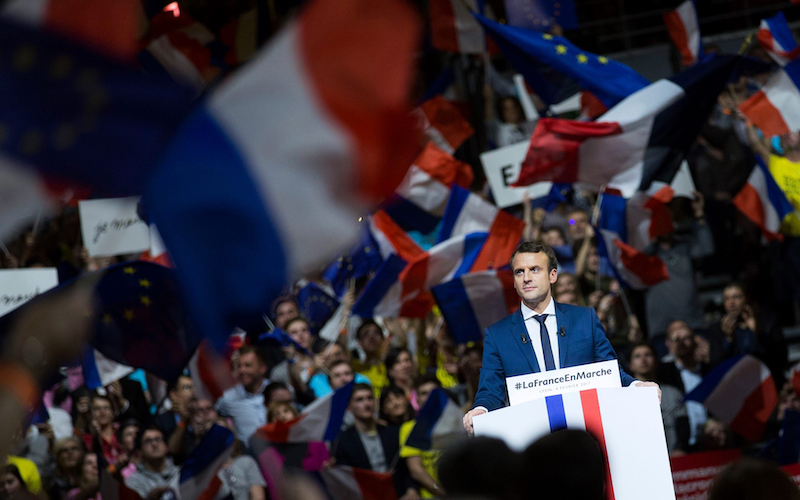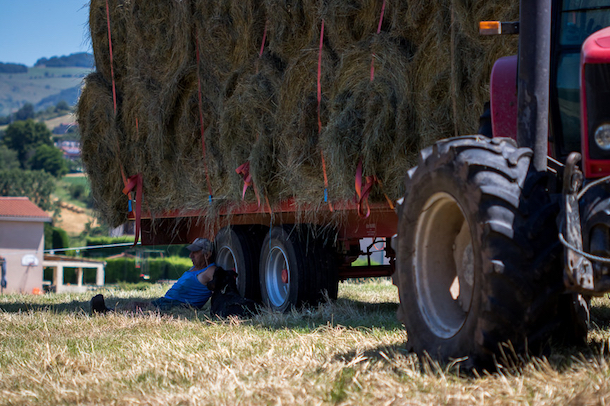
Macron and Le Pen Duel for France’s Environmentalist Vote
Going into the first round of the French presidential elections, it was the environment and not the European Union that served as a major dividing line among the 11 candidates. The two major hopefuls running on the left, Jean-Luc Mélenchon and Benoit Hamon, made ecological issues a major pillar of their campaigns: both emphasized organic agriculture, as well as switching France over entirely to renewable energy by 2050. Mélenchon went furthest of all, demanding a new “green clause” to the constitution. Indeed, while foreign pundits tend to focus on Marine le Pen and Melenchon’s toxic brand of Euroskepticism, surveys show that French voters care about the environment considerably more.
Now, as first-round winners Emmanuel Macron and Le Pen try to win over green-minded voters that rallied to Mélenchon in the first round, both are boosting their environmental creds to try and channel one of the most successful components of the left-winger’s campaign. Given that the left accounted for more than 25% of the ballots cast, successfully convincing Mélenchon and Hamon voters that they are the better choice for the environment and French agriculture could be the key to victory.
That battle is now in full swing. Macron has voiced steady support for centrist environmental initiatives such as raising the carbon tax and boosting France’s wind and solar energy capacity, but he has also been the subject of criticism for being inconsistent and not going far enough. Some green activists have denounced the allegedly anti-environment policies he pushed as Francois Hollande’s minister of the economy. Secondly, Mélenchon was able to successfully attack Macron’s ties to business, pointing to them to claim Macron was in the pocket of corporations. Even so, the former Rothschild banker hopes to win over ecologically-focused voters by moving himself closer to the ground once occupied by Mélenchon and Hamon.
Marine Le Pen will have a harder time making that case, but it does seem she will challenge Macron on the environment nonetheless. Unlike her populist counterpart Donald Trump, Le Pen endorsed a “nationalist environmental movement” in 2014. Then again, Le Pen’s brand of environmentalism (which rejects international climate talks or agreements) is toxic to many of the voters she is now gunning for. Perhaps in recognition of that fact, the National Front leader came out earlier this year with calls for a zero-carbon economy.

Surprisingly, Macron and Le Pen do share some worrying overlap in their environmental policies, especially when it comes to food and agriculture. Macron’s platform, for instance, calls for a minimum of 50% organic food in cafeterias and a plan to phase out the use of pesticides. Le Pen, demonstrating a bit more flair, has railed against multinationals and accused them of using pesticides for “poisoning the land.” Those positions, however, come with substantial risks: an extreme stance on pesticides is not only unpopular with other segments of the electorate, like farmers, but also flies in the face of established science and France’s economic interests.
It’s worth noting that Macron and Le Pen’s mutual call to end pesticide use in France comes even as the European Food Safety Authority (EFSA) found last month that food consumed in the EU is either mostly pesticide-free or safely within legal limits, posing little to no risk to consumers. In France, however, regulators like EFSA have had a difficult time reassuring the public because of an anti-pesticides campaign being waged by French environmentalists at both the national and EU levels. By appealing to anti-industry sentiments and pressuring both policymakers and regulators, these campaigners have changed the terms of France’s environmental debate.
For example, the ongoing controversy over glyphosate provides a textbook example of how this process has shaped France’s political climate. In March 2015, the Lyon-based International Agency for Research on Cancer (IARC) launched a heated scientific battle by labelling glyphosate “probably carcinogenic.” Even though that classification has been contradicted by findings from not only EFSA but also the European Chemicals Agency (ECHA), the Environmental Protection Agency (EPA) and a joint panel of the World Health Organization & the Food and Agriculture Organization (WHO/FAO), France’s Ecology-Green Party and partner groups in the European Parliament have been able to capitalize on it to delay the EU’s relicensing of glyphosate.
Two years on, the IARC finding continues to serve as an important public relations tool for the French green movement, despite its status as a scientific outlier. In the United States, meanwhile, Congressional lawmakers are investigating IARC and affiliated bodies (such as Italy’s Ramazzini Institute) for their use of US government funding to conduct their research. Even so, the campaign waged at the European level has succeeded in pushing the remaining French presidential candidates to adopt blanket anti-pesticide platforms.
While environmentalists chalk this up as a victory, the debate has set off alarm bells among French farmers, a highly symbolic and influential constituency. France is the EU’s number one agricultural producer and the biggest recipient of subsidies under the Common Agricultural Policy (CAP), and yet French farmers have been in increasingly dire straits, struggling with strict European regulations as well as low yields and compensation. As such, farmers flocked not to Mélenchon, Hamon, or Macron, but instead to Le Pen’s far-right, anti-European candidacy. Even though they receive benefits from the CAP’s subsidy program, French farmers also see themselves as shackled by European regulations on pesticides and simultaneously exposed to unfair competition from other markets. As a result, Le Pen had thus far represented (at least for the farmers) a hope for freedom from EU standards combined with protection from globalized agriculture. By shifting her stances, though, Le Pen’s platform now leaves these longtime supporters in a bind.
In all likelihood, it will be Emmanuel Macron’s stance that makes the most difference to those farmers after the election. By taking up the anti-pesticide mantle once carried by his rivals, Macron is making a play for left-wing votes but could also be committing himself to policies that do not ultimately serve the French public’s interests. He is already walking a fine line between environmentalists and the agricultural community, and assuming he does in fact become the next president, he’ll need to think seriously about how to enact sound environmental safeguards while making sure France’s farmers can sustain their industries.
